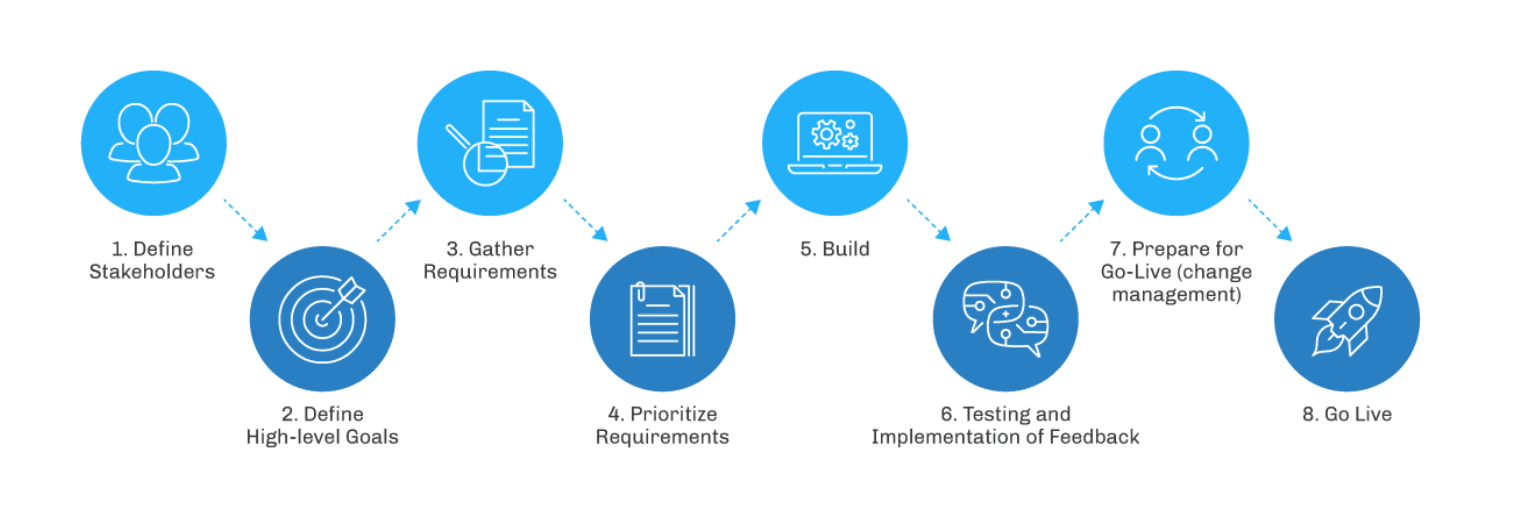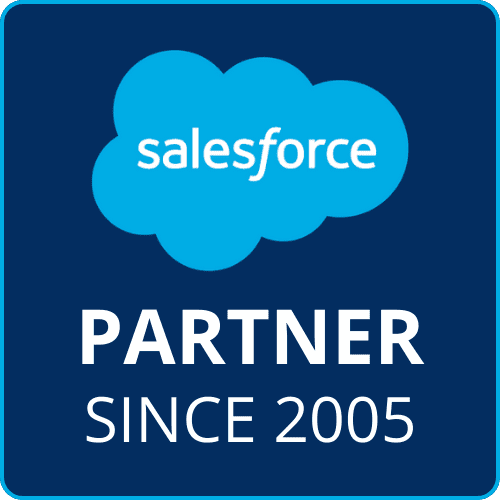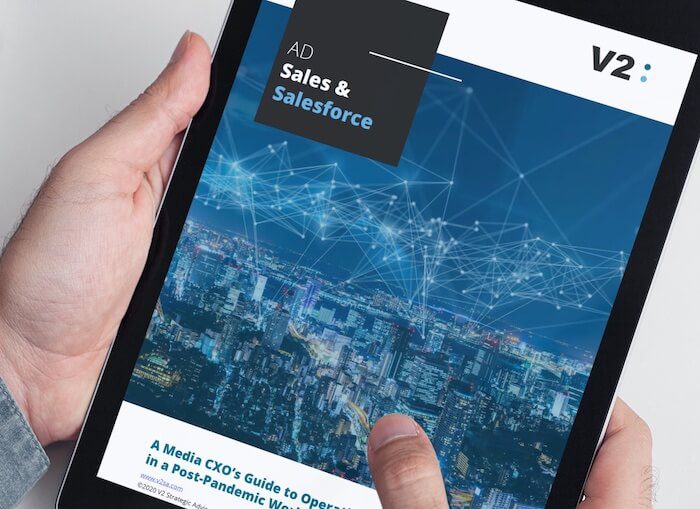What is a Salesforce Implementation?
Most of the time, when you hear people talking about a “Salesforce implementation,†they are referring to setting up and configuring a new Salesforce org, or perhaps enhancing an existing Salesforce instance, to meet new or changing business-specific requirements.
Properly thinking through your organization’s requirements, applying those requirements to how a Salesforce system architecture should be designed, breaking up work into its corresponding design, configuration, and development tasks, and executing it could be summarized as “Salesforce Implementation†work. In addition to what’s stated here, implementations can involve activities such as process improvement, change management, data migration, integration with upstream and downstream systems, user training and adoption management, to effectively utilize Salesforce to streamline sales, service, marketing, and other key functions.

As a Salesforce partner who has worked in the implementation space for many years, we have seen and supported hundreds of implementations. In our experience, the biggest and most challenging aspects of a Salesforce implementation usually have nothing to do with the configuration of the technology, but rather with scoping and planning, aligning executives and internal stakeholders to build consensus around requirements, finalizing key decisions, navigating process improvement initiatives, and executing proper change management activities to ensure a successful launch and to maximize post-launch adoption outcomes.
Often, partners can play a critical role in assisting Salesforce customers through this process, because external teams bring experience, perspective, and best practices in helping shepherd the right conversations and decisions along the way, ensuring all the right details are considered throughout the transformation journey.
What is the Role of a
Salesforce Implementation Partner?
A Salesforce Implementation Partner, sometimes referred to as an “SI†within the ecosystem, is a consulting firm or agency that provides, among other things, services to help with the planning, design, and deployment of Salesforce solutions for Salesforce customers. These partners deeply understand the Salesforce platform and can help organizations leverage it to vastly improve their sales, service, marketing, and other business functions.
Salesforce implementation partners work closely with their clients to understand their unique business requirements and help them select, design, and configure the right Salesforce solutions to meet their needs. Partners may also provide training and ongoing support to help users get up to speed with new systems and processes.
In addition to implementation services, Salesforce partners like V2 may offer highly customized development and integration services to help businesses optimize their platform use. Choosing the right Salesforce implementation partner can be critical to the success of a Salesforce deployment and ensuring that customers get the most value from their investment in the platform. But how do you know if and when you need a partner?

While many companies have brilliant in-house Salesforce administrators or entire teams dedicated to Salesforce, many businesses require those teams to keep the lights on day-to-day, and can’t afford to reassign them to new projects that will require all of their time and attention. Other times, the scope of your implementation may be highly complex and demand a level of expertise and skill not found in your current team. This is where leveraging a Salesforce Partner can come into play because Salesforce implementations oftentimes require specialized knowledge and expertise, so it’s important that you determine your internal team’s capabilities and if you might better achieve your desired outcomes by recruiting more specialized assistance and coaching.
Even in scenarios where your team might have capacity and the proper skill sets to execute an implementation, it is important to consider risks associated with any technology transformation project. Disruptions to timeline, changes in technology, and resource attrition can all contribute to challenges in taking on a Salesforce implementation without a partner. Simply put, while choosing to work with a Salesforce implementation partner may represent an additional, and oftentimes, sizable, investment for your company, going through an implementation without the right team could cost your organization even more in the long run and overall delay your time to realize value.
An experienced Salesforce partner will help you reduce risk across the full the implementation process and can oftentimes support with a range of activities, including:
Scoping and Project Planning: Assessing the high-level business requirements, identifying key teams and stakeholders, defining the project scope and goals, and mapping out a detailed project work back plan.
Designing and Blueprinting: Organizing relevant workshops to meet with stakeholders, managers, and end users to determine and analyze the detailed-level requirements and translating those requirements into a design blueprint that can be executed upon.
Configuration and Development Activities: Setting up Salesforce to meet the specific needs of the business, including configuring the architecture, customizing data fields, creating workflows and processes, configuring security settings, and developing custom code-based solutions, where applicable.
Data Activities: Assessing, cleansing, and migrating data from existing systems into Salesforce, including customer information, sales data, and other relevant data points, as well as putting data governance policies and processes in place.
Integration Activities: Architecting, configuring and testing integrations between Salesforce and upstream or downstream business systems, such as marketing automation tools or billing systems
Testing: Testing the system across one or many testing environments to ensure that it is working as intended. Testing usually encompasses UAT as well as deep systems testing leveraging test-based scripts in order to fully validate that the design, data and processes are accurate and reliable.
Deployment: Preparing the system for launch and ensuring proper cutover from any legacy systems and processes, as well as managing any critical post-launch steps.
User Training and Adoption: Providing training to users to help them understand how to use Salesforce and encouraging adoption of the system throughout the organization.
Why Should We Consider a
Boutique Salesforce Implementation Partner?
Let’s be honest, there are thousands of system integrators out there in the marketplace, all you have to do is look at the Salesforce AppExchange to see a list of those companies, and they come in all shapes and sizes. But why should you specifically consider entrusting a boutique partner over one of the larger firms?
As stated, no Salesforce implementation is the same. Additionally, there are lots of brilliant companies and people who know how to build and use Salesforce; after all, Salesforce has been around since 1999, so there is a large and thriving ecosystem of partners and experts that have been established for many years.
Salesforce customers looking for a “one-size-fits-most†approach to their implementation may find success working with a variety of partners, from the Global System Integrators (GSIs), to regional partners, to boutiques. That said, for customers looking for a more nuanced approach, we recommend customers seek out boutique partners like V2, because these partners typically operate with specialized, deep subject-matter industry or cloud expertise. At a boutique like V2, for example, we provide the ecosystem industry-specific expertise, offering a well-tested point of view around a small set of industries, including Media, Communications, and Retail We bring years of experience implementing and optimizing Salesforce for similar types of customers so it’s a quicker path to setting up your environment to be aligned with industry-specific best practices. As an industry-focused partner, we not only train our consultants in your industry, but we hire key team members who have actually worked inside companies and industries like yours, so we come to the table already understanding the complex business processes and pain-points of your unique environment. This knowledge helps supercharge your implementation project, ensuring the ultimate solution is designed with those industry-specific considerations upfront.
Additionally, boutiques can offer a better experience for your team members, pairing them up with a consulting services team that is already in the know, about the world that you move and operate within. At V2, we can’t tell you the number of times we’ve been on a client call hearing from one of our clients who shares just refreshing it is to speak with an entire team that “gets itâ€. This has become an important part of the V2 difference.

Additional Considerations When Choosing a
Boutique Salesforce Partner
In addition to what has already been shared above, here are some additional benefits of using a more specialized partner to helping you navigate your next Salesforce Implementation:
Personalized approach: Boutique Salesforce implementation partners typically work with a smaller list of select clients than larger firms, allowing them to provide more personalized attention and tailored solutions for each client.
Specialized expertise: Boutique implementation partners often specialize in specific industries or specific Salesforce products, giving them a deeper understanding of the unique needs and challenges faced by businesses in those areas. For example, as an industry-focused partner, V2 was hand-selected by Salesforce to serve as a Global Launch Partner for the Media Cloud Advertising Sales Management product last year, due V2’s deep and long heritage of working with and supporting Salesforce customers in Media and Communications.
Agile and flexible approach: Boutique implementation partners are often more nimble and agile than larger firms, allowing them to adapt quickly to changing requirements and provide more flexible solutions, typically without requiring change orders.
Lower cost services: Boutique implementation partners oftentimes have lower operating costs and can provide more competitive pricing than larger firms.
Stronger relationships: Boutique implementation partners offer more personalized services, and offer dedicated teams that may be aligned to only your project, as opposed to larger firms where a given Account Manager could have between 5-10 different client projects running simultaneously. In addition, boutique partners can offer greater access to executive sponsors, to ensure your project is governed appropriately and with the attention it deserves. What this means for you, the client, is that you get to really know your partner team, and this often results in the development of a much stronger partnership for the duration of the project and beyond, which in turn, fosters a greater sense of trust and collaboration and also quicker time to value, as resources are dedicated versus operating with a “revolving door.â€
Innovative solutions: Boutique implementation partners may be more open to experimenting with new ideas and innovative solutions, helping businesses to stay ahead of the curve and achieve better outcomes. As an example of this in action, V2 staff internal innovation teams are taking off-the-shelf Salesforce products and thinking through how to enhance these solutions for our client’s specific needs.
Most recently, we developed an innovative solution that bolts onto Media Cloud, called the Data Clean Room Accelerator, which allows for a direct connection to be made between Salesforce and Snowflake, so that users can more easily create and manage their Clean Rooms from directly within the Salesforce Media Cloud platform.
+
Working with a boutique Salesforce implementation partner can provide businesses with specialized expertise, more personalized attention, and greater flexibility both in terms of approach and implementation model, while also helping to reduce costs and foster stronger relationships.
Building Trust Starts With A Conversation.
If you are interested in learning more about how our team of Salesforce experts can help improve your team’s capabilities, reach out today and schedule a conversation–we’d be glad to help and advise you on this important journey.


